

Open Government and Technology: Groundhog Day. I came across a recent paper by Jan van Dijk that looks at the claims and achievements of digital democracy in the last 25 years.
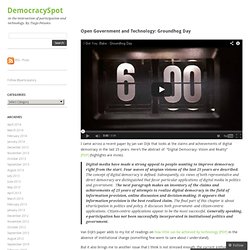
Here’s the abstract of “Digital Democracy: Vision and Reality” [PDF] (highlights are mine): Digital media have made a strong appeal to people wanting to improve democracy right from the start. Four waves of utopian visions of the last 25 years are described. The concept of digital democracy is defined. Sommes-nous représentés ? Loïc Blondiaux est professeur à l’université Paris I (Panthéon-Sorbonne, Centre Européen de Sociologie et de Science Politique).
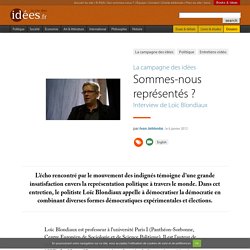
Il est l’auteur de nombreux articles et ouvrages dont La Fabrique de l’opinion (Paris, Seuil, 1998), Le débat public : une expérience française de démocratie participative (Paris, La découverte, 2007, en co-direction), Le Nouvel esprit de la démocratie. Actualité de la démocratie participative (Paris, Seuil, 2008) et Pour une 6ème République écologique (Paris, Odile Jacob, 2011, en collaboration). Vidéo réalisée par David Bornstein. Montage : Emilie Frenkiel. Si la vidéo ne s’affiche pas ci-dessus, vous pouvez essayer de la voir sur Dailymotion. Foresight Engine. Accueil. La démocratie participative compte désormais un nouvel outil : les ateliers citoyens.
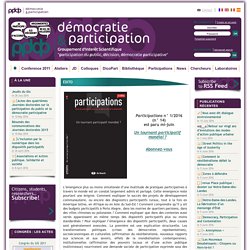
Initié et piloté par le secrétariat général pour la modernisation de l’action publique (SGMAP), dans le cadre du plan d’action pour une action publique transparente et collaborative, ce dispositif inspiré des conférences de citoyens permet de recueillir l’avis de Français sur une question qui les concerne directement : question éthique ou sociétale, sujet polémique ou à fort enjeu, évolution d’une politique publique… Avec un prérequis : il doit être organisé en amont d’une décision, lorsque le choix politique est encore ouvert. The Tyranny of Stuctureless. For everyone to have the opportunity to be involved in a given group and to participate in its activities the structure must be explicit, not implicit.
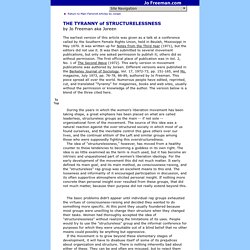
The rules of decision-making must be open and available to everyone, and this can happen only if they are formalized. This is not to say that formalization of a structure of a group will destroy the informal structure. It usually doesn't. But it does hinder the informal structure from having predominant control and make available some means of attacking it if the people involved are not at least responsible to the needs of the group at large. "Structurelessness" is organizationally impossible. "Elitist" is probably the most abused word in the women's liberation movement.
Correctly, an elite refers to a small group of people who have power over a larger group of which they are part, usually without direct responsibility to that larger group, and often without their knowledge or consent. Why Social Movements Should Ignore Social Media. There are two ways to be wrong about the Internet.

One is to embrace cyber-utopianism and treat the Internet as inherently democratizing. Just leave it alone, the argument goes, and the Internet will destroy dictatorships, undermine religious fundamentalism, and make up for failures of institutions. Another, more insidious way is to succumb to Internet-centrism. Internet-centrists happily concede that digital tools do not always work as intended and are often used by enemies of democracy.
What the Internet does is only of secondary importance to them; they are most interested in what the Internet means. They arrive at this reform agenda in a rather circuitous way. Once the elusive logic of the Internet has been located, it is not uncommon to see Internet-centrists move to deflate its actual novelty. Benkler does not view the Internet as a tool so much as an idea that proves (and disproves) philosophical theories about how the world works. Diversity needs a voice. Towards Open and Innovative Governance. Scott Lash: Objects that Judge: Latour’s Parliament of Things. Towards a Non-modern Constitution Bruno Latour argues for the rights of the object.
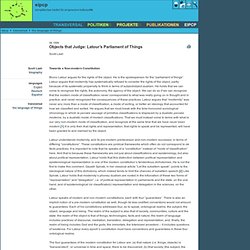
He is the spokesperson for the “parliament of things”. Latour argues that modernity has systematically refused to consider the rights of the object, partly because of its systematic propensity to think in terms of subject/object dualism. He holds that we can come to recognize the rights, the autonomy, the agency of the object. We can do so if we can recognize that the modern mode of classification never corresponded to what was really going on in thought and in practice, and never recognized the consequences of these practices. Comment internet transformera un jour le gouvernement. Magnifique présentation de Clay Shirky, qui explique les impactes potentiels d’internet en prenant comme exemple les débouchés de l’imprimerie : la réforme, la révolution, la science… En voici quelques morceaux choisis : Même la presse à imprimer était supposée être un outil qui allait faire respecter l’hégémonie intellectuelle catholique dans toute l’Europe.

Au lieu de cela, nous avons obtenu les 95 thèses de Martin Luther et la réforme protestante. Rapporteurs.be. About openDemocracy. OpenDemocracy - is a digital commons not a magazine – a public service on the web not a commodity - is an independent, public interest, not-for-profit; a counter to the corporate media- champions human rights- seeks out and debates forms of democratic change- delights in good ideas vigorously debated and argument backed by investigation- critiques vested interests - supports pluralist inclusion without populism and tries to a give voice to those marginalised- tries neither to blink at the crisis of government nor cultivate alarmism- opposes fundamentalisms, including market fundamentalism- regards the freedom and liberty of others as our own- practices 'openness', rather than grasp at stultifying ‘neutrality’- publishes under Creative Commons licensing- supports peace-making and reconciliation- is committed to global education and encouraging good and creative writing- welcomes a range of forms to enable us to respond swiftly and interrogate deeply openDemocracy in numbers Sections Legal.
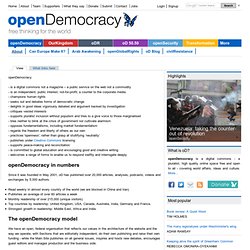
Subterranean Politics in Europe. Subterranean Politics in Europe is a research collaboration based at the London School of Economics and Political Science exploring bottom-up politics across Europe through case studies in Germany, Spain, Italy, Hungary and London.
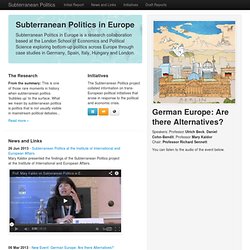
The Research From the summary: This is one of those rare moments in history when subterranean politics ‘bubbles up’ to the surface. What we mean by subterranean politics is politics that is not usually visible in mainstream political debates... Read more » Initiatives The Subterranean Politics project collated information on trans-European political initiatives that arose in response to the political and economic crisis.